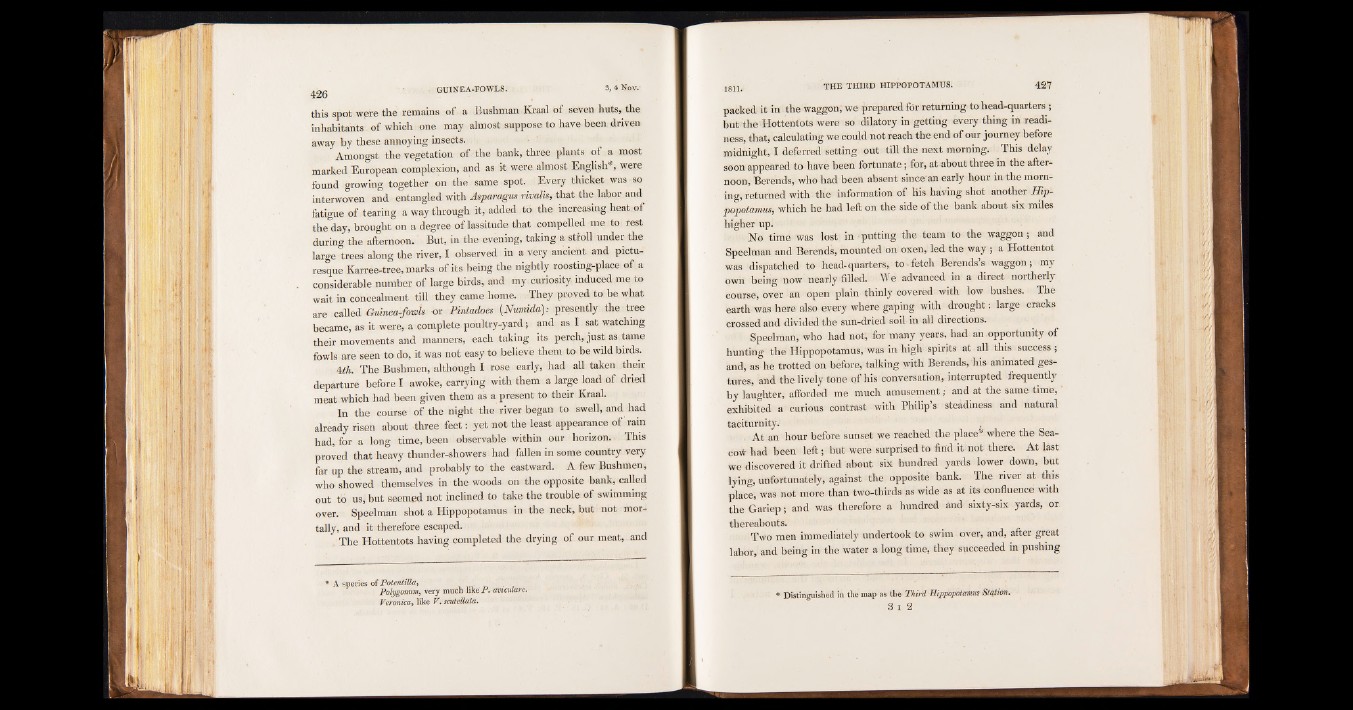
this spot were the remains of a Bushman Kraal of seven huts; the
inhabitants of which one. may almost suppose to have been driven
away by these annoying insects.
Amongst the vegetation of the bank, three plants of a most
marked European complexion, and as it were almost English*, were
found growing together on the same spot. Every thicket was so
interwoven and entangled with Asparagus rivalis, that the labor and
fatigue of tearing a way through it, added to the increasing heat of
the day, brought on a degree of lassitude that compelled me to rest
during the afternoon. But, in the evening, taking a stroll under the
large trees along the river, I observed in a very ancient and picturesque
Karree-tree, marks of its being the nightly roosting-place of a
considerable number of large birds, and my.curiosity, induced me to
wait in concealment till they came home. They proved to be what
are called Guinea-fowls or Pintadoes {Numida): presently the tree
became, as it were, a complete poultry-yard; and as I sat watching
their movements and manners, each taking its perch, just as tame
fowls are seen to do, it was not easy to believe them to be wild birds.
4th. The Bushmen, although I rose early, had all taken their
departure before I awoke, carrying with them a large load of dried
meat which had been given them as a present to their Kraal.
In the course of the night the river began to swell, and had
already risen about three feet: yet not the least appearance of rain
had, for a long time, been observable within our horizon. This
proved that heavy thunder-showers had fallen in some country very
far up the stream, and probably to the eastward. A few Bushmen,
who showed themselves in the woods on the opposite bank, called
out to us, but seemed not inclined to take the trouble of swimming
over. Speelman shot a Hippopotamus in the neck, but not mortally,
and it therefore escaped.
The Hottentots having completed the drying of our meat, and
* A species of Potentilla,
Polygonum, very much like P . amculare.
Veronica, like V. scutellata.
packed it in the waggon, we prepared for returning to head-quarters ;
but the Hottentots were so dilatory in getting every thing in readiness,
that, calculating we could not reach the end of our journey before
midnight, I deferred setting out till the next morning. This delay
soon appeared to have been fortunate; for, at about three in the afternoon,
Berends, who had been absent since an early hpur in the morning,
returned with the information of his having shot another Hippopotamus,
which he had left on the side of the bank about six miles
higher up.
No time was lost in putting the team to the waggon; and
Speelman and Berends, mounted on oxen, led the way ; a Hottentot
was dispatched to head-quarters, to ■ fetch Berends’s waggon; my
own being now nearly filled. We advanced in a direct northerly
course, over an open plain thinly covered with low bushes. The
earth was here also every where gaping with drought: large cracks
crossed and divided the sun-dried soil in all directions.
Speelman, who had not', for many years, had an opportunity of
hunting the Hippopotamus,1 was in high spirits at all this success ;
and, as he trotted on before, talking with Berends, his-animated gestures,
and the lively tone of his conversation,.interrupted frequently
by laughter, afforded me much amusement ; and at the same time,
exhibited a curious contrast with Philip s steadiness and natural
taciturnity.
, At an hour before sunset we reached the place* where the Sea-
coW had been left; but were surprised to find it not there. At last
we discovered it drifted about six hundred yards lower down, but
lying, unfortunately, against the opposite bank. The river at this
place, was not more than two-thirds as wide as at its confluence with
the Gariep; and was therefore a hundred and sixty-six yards, or
thereabouts.
Two men immediately undertook to swim over, and, after great
labor, and being in the water a long time, they succeeded in pushing
* Distinguished in the map as the Third Hippopotamus Stqtion.
3 i 2